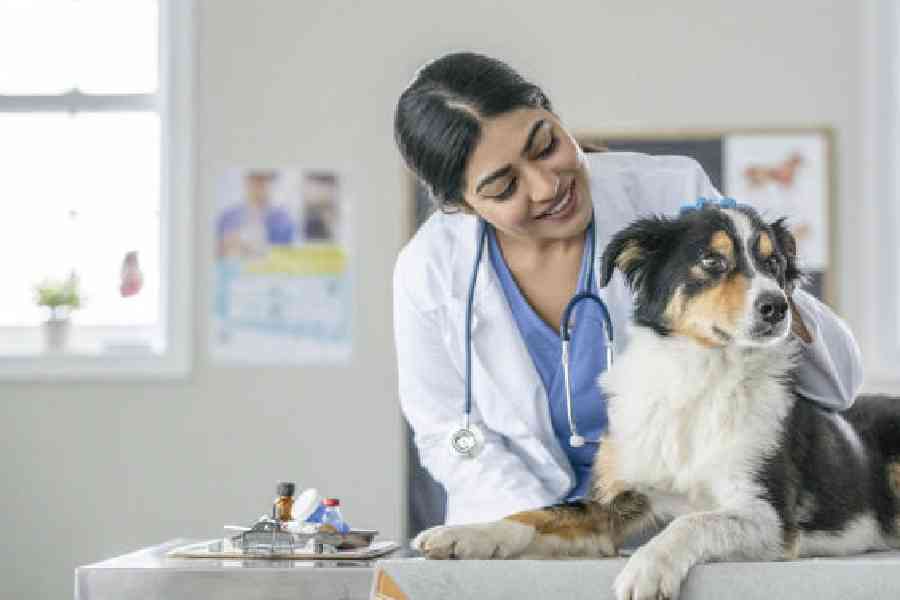The vet life: The zeal to build up a career after studying veterinary science


Now is a good time as any to opt for veterinary sciences, says former dean and professor of West Bengal University of Animal and Fishery Sciences (WBUAFS), Dr Nilotpal Ghosh. In 2023, the pet population of India stood at an all-time high of 32 million and it is only expected to go up. But there are not enough veterinary doctors around.
Dr Ghosh continues, “In West Bengal, there is only one veterinary science college, the WBUAFS and admission is through the NEET UG exam.”
Students with subjects such as physics, chemistry, biology or biotechnology and with a minimum 50 per cent in their boards are eligible for admission.
“Our college has 100 seats, out of which 85 are reserved for students with West Bengal domicile,” says Dr Ghosh. He adds, “Students may avail the other 15 per cent seats as well if they enlist themselves for the all-India counselling conducted by the Veterinary Council of India.”
In India, there are about 70 government colleges and 8-10 private colleges where veterinary science is taught. If you are confused about choosing a college, here is what you need to look out for.
“Your college should either be ‘truly’ recognised or provisionally recognised by the Veterinary Council of India,” says Dr Ghosh. All colleges follow a set curriculum spread over five-and- a-half years. It includes a year-long internship at the end of the programme.
Within these five years, a wide range of subjects are taught. These include veterinary surgery, veterinary microbiology, pharmacology and toxicology, veterinary gynaecology and a few non-clinical subjects such as animal nutrition, animal genetics and breeding, anatomy and physiology, livestock production management, livestock products technology and veterinary public health.
Dr Ghosh says, “Veterinary public health is especially important nowadays because it studies illnesses that affect both animals and humans.”
Dr Dipak De, former dean of WBUAFS and former president of the Indian Society for Veterinary Surgery, says, “There has always been a huge demand for veterinary doctors in India and abroad. If a student can complete his or her bachelor’s in veterinary science, he/she will find it quite easy to get a job with a starting salary of around
₹ 40,000 or more.”
He continues, “But many students choose to pursue a master’s degree or a PhD. To specialise in a subject of their choice, students need to apply for a master’s degree under the Indian Council of Agricultural Research or ICAR.”
The Indian Council of Medical Research (ICMR) also provides many research opportunities to veterinary doctors and scientists.
However, if someone wants to start working right after completing a bachelor’s degree, they first need to register themselves with the West Bengal Veterinary Council or Indian Veterinary Council.
Dr Ghosh explains that there are several opportunities for medical practice and research in both government and private enterprises. “Animal Resources Development or ARD is the major recruiter for government jobs in the state,” he says. “Graduates need to appear for Public Service Commission interviews conducted by the ARD.” Besides, veterinary doctors are hired contractually for government projects like the Mobile Vet Clinic or MVC.
Graduates can join the department of animal husbandry and dairy for further research opportunities or the Remount Vet Corps, a branch of the Indian Army. They can also join private service in the feed industry, poultry farms and vaccine production.
If a student is interested in biomedical research, he or she may join laboratories that work on drug trials, in both private and governmental enterprises. Animal scientists are involved in most drug trials because those are tested on animals first.
Private clinics are also doing quite well in India nowadays, says Dr Ghosh. According to him, the scope is only going to get better as India’s pet population is growing exponentially.
However, both Dr Ghosh and Dr De warn that students should not opt for veterinary science only due to the range of opportunities it offers. Dr De feels that one needs to be an animal lover to be a veterinary doctor. He says, “You have to touch them and get along with them to be able to diagnose and treat them well.” According to him, the drill is not any different from that of doctors who treat human beings.
Dr Ghosh agrees: “If you are not so much into animals, you may opt for research projects. But prospective students should at least have an orientation towards biology.”